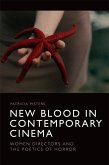The only Japanese director to have won the Palme d'Or from Cannes more than once, and second only to Ozu Yasujiro in the number of times he has won the prestigious Kinema Jumpo Best One award, the late Imamura Shohei was one of Japan's leading and most controversial film directors. This book is one of the first to study all of Imamura's major films alongside his television and theatrical documentaries, focusing on his major themes and concerns. By giving shape to Imamura's career, the book positions him as a stylistic innovator as well as an ethnographic investigator into Japanese culture and tradition; the preeminent examiner of the hidden, barely repressed underpinnings of Japanese society.
Dieser Download kann aus rechtlichen Gründen nur mit Rechnungsadresse in A, B, BG, CY, CZ, D, DK, EW, E, FIN, F, GR, HR, H, IRL, I, LT, L, LR, M, NL, PL, P, R, S, SLO, SK ausgeliefert werden.









